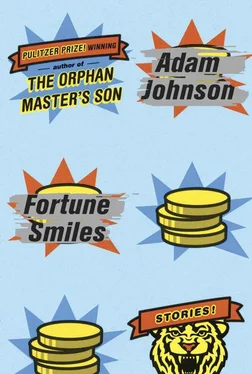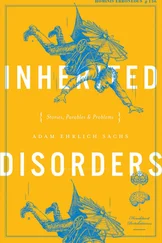As if on cue, Prinz makes his contribution to the memorial.
I remove a dog-waste bag from my pocket. It is biodegradable.
As I collect the dog crap, I speak to Prinz. “Did you hear that?” I ask him. “This tree is a reminder of the life of the playwright Klaus Wexler.” Then I pretend Prinz is talking to me. I cup my ear. “What’s that you ask, little doggie? Who is Klaus Wexler, and why would a fine writer be in prison?”
The teens look at me like I’m crazy.
But I continue, answering Prinz’s question. “He was a fine playwright, that can’t be disputed, my little doggie. But as I recall, far from being a persecuted playwright, Herr Wexler was a pervert and a drug addict who embezzled money from the Deutscher Bühnenbund to print pornographic flyers inviting women to dress up like Secretary Honecker, so he could photograph himself having sexual intercourse with our nation’s leader for the purposes of ‘art.’ ”
The curator smiles. “That is an amusing story,” he says. “I hope sex and art were legal in the GDR. Or was there a special prison for the pursuit of pleasure? And if Klaus Wexler’s crime was embezzlement, why did he not go through the criminal courts? Why did the Stasi bring him here, to a secret interrogation prison?”
Prinz gets frisky when he finishes his business. He scratches in the dirt and barks a sharp, taunting bark. This interests the empty-eyed students more than our conversation. “What your tour guide here doesn’t mention,” I say to them, “is that I used to be in charge of this prison. So Klaus Wexler was more than a brass plaque to me. He was a real person, and when he confessed his true crime, I was there to hear it. Note that your tour guide didn’t dispute that the playwright was a sexual deviant, a drug addict and a thief. But what Klaus Wexler confessed to was much worse. It is something your tour guide probably doesn’t want you to hear.”
“On the contrary,” the curator says. “This is a rare opportunity for us.”
“This time of year was confession season,” I say. “It starts when the first frost arrives. The cold takes up residence in the concrete walls and steel doors, and everyone knows that it is here to stay. Many inmates were arrested in summer demonstrations, and over their first few months, as they come to understand the true meaning of the word solitude, these new inmates regret the foolish ways they have transgressed against the state and they begin wanting to confess. But plotting against your country and its people, that is no small thing. When an inmate signals he is ready to confess, that is when he would be sent down to the bottom of the prison, to the part they called the U-boat, for a good long while.”
There is a young woman with stereo speakers in her ears — I cannot tell if she is listening to me or to popular music. I try to look into her eyes, but she holds up a cellular phone, pointing it at me like it will protect her from the truth I have to say.
“So the criminal feels like confessing,” I tell her. “So what. He does not get to choose, like it is a favor . He must long for it. He must harvest a single-minded desire to do nothing on earth but reveal, everything, and this moment comes with no coronation. No, the criminal must place this confession on a tin plate, along with his hopes and sorrows and some cold potato peels, and this he must send through the muck-tray slot in his cell door like the rest of them.”
Behind the phone, the girl’s eyes go wide.
“The playwright,” the curator says.
“Yes, the playwright,” I say. “I went down to the U-boat personally. There Klaus Wexler admitted he had plotted to escape East Germany, that he had copied his manuscripts, and at a performance of his latest play in Austria, he intended to flee. Personally, I think it was wrong for the GDR to restrict the movements of its citizens. It was a good country, a free country, and if people wished to leave, they should have been allowed to. But those weren’t the rules, and it wasn’t for us to decide. A pilot must obey the laws of aerodynamics, a doctor the protocols of medicine.”
Steam rises from the dog-waste bag. I twist its neck into a knot and point at the curator. “Here is what the playwright confessed to: weeping, he told the interrogators that he had made no provisions for his elderly parents, that they were poor and weak and had no one, that he was going to abandon them, cold and alone, to their hastened deaths. With my own ears, I heard him say he was lucky to have been reported and caught. That is the truth of your beloved playwright. And in this way we saved Wexler from the bigger crime: condemning his parents to a slow, isolated death of hunger and infirmity.”
The curator asks me, “Did Herr Wexler make this confession in the water cell?”
“I was not Stasi, I was not an interrogator. I was a civil servant, a prison administrator, but there was no torture here, if that’s what you’re implying,” I tell him. “Not one person can show a single scar or bruise or wound from his time here. Not a single photograph can be produced to prove that an inmate was injured in my prison.”
“Was Klaus Wexler naked when he made this confession?” the curator asks. “And had he been in total darkness, standing in ice water, as he later claimed?”
“The water was collected from the rain gutters,” I tell them and point toward the roof of the remand center. “It was stored in that tank. In the summer, the water was warm, and in the winter, it was cold. That was the only method to its temperature.”
The students raise their heads to the roof, their breath visible in the November air.
Here I lift my little dog and hold him. “Neither officers nor lawyers nor judges make the laws,” I say. “Still they must be followed.”
The curator offers a slight bow and says, “Thank you for the educational discussion,” before moving the high schoolers toward the museum’s gift shop.
—
Prinz and I spend the afternoon creating a surveillance device. I rummage the garage until I find our old Polaroid camera and a spool of fishing line for the trip wire. Prinz is a loyal assistant. He sits on a stool beside me, and as long as he gets a goldfish cracker every few minutes, he follows everything I do with great interest.
But how to get the pull of a wire to depress a shutter button?
I try various mechanisms — the flange of a toilet handle, the scissor arm of a garlic press and the lever of a paper punch. None works. It gives you a lot of respect for the Stasi, who were the masters at such things. They made cameras out of cuckoo clocks, bow ties and tree stumps. Yes, the Stasi may have turned the lower levels of my prison into an all-night spook show. But you have to admit — they were ingenious.
Finally, I use a brake caliper from my daughter’s old bicycle. This I attach to the camera’s plastic frame with two small screws. Did I mention I have a daughter? She’s wonderful, grown already and married. I see her every summer and every Christmas, like clockwork. I point the camera at Prinz and give the fishing line a test pull, causing the brake arm to rotate. When the lever depresses — flash!
“Now we will catch our mysterious package leaver,” I tell Prinz.
Even though his tongue is bright orange, I reward his loyalty with a bonus goldfish.
But the square of film the old camera spits out must have been trapped in there for years. Prinz and I watch it develop: slowly, a grainy image of my wife appears. She is reclined against a white sheet, and she is without clothing. Her eyes appear seductive, her face is not softened by liquor, and I know right away that I did not take this picture.
When it’s dark, I sneak outside and set up the camera, hiding it behind a pumpkin and stringing the trip wire through a scattering of leaves. Prinz contributes his urine. Then I return with the package and place it on the dining table with the others.
Читать дальше












